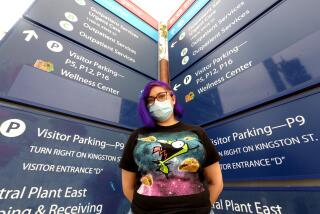Crowding hampers L.A. County hospitals’ handling of mentally ill
The psychiatric emergency services at two county-run hospitals are so overcrowded that mentally ill patients have to sleep on mattresses on the floor, health officials acknowledged this week.
The packed conditions at Olive View-UCLA Medical Center and Harbor-UCLA Medical Center make it more difficult to de-escalate the emotions of patients who arrive at the hospital agitated and anxious, said Christina Ghaly, deputy director of strategic planning for the Los Angeles County Department of Health Services.
“We fully agree this is not an optimal placement,” Ghaly said Friday. “This is not the best way to care for patients. But at the county hospitals, we are at the mercy of who comes to our door.”
Ghaly said the issue of overcrowding is not new and that county health officials recognize that something has to be done to accommodate more people.
Olive View has 12 beds in its emergency room set aside for psychiatric patients but typically houses about 20 and occasionally has as many as 30, Ghaly said. The hospital cannot add full-sized beds because of fire safety concerns. So, in addition to sleeping on the floor, patients are regularly housed in an overflow area or in interview rooms, she said.
Harbor-UCLA has space for 16 beds but on an average day has 20 psychiatric patients.
This week, a patient advocate sent a complaint to the Board of Supervisors, The Times and the federal government, saying that it was “dangerous and unsanitary” for patients to sleep on the floor.
“Psychiatric patients are being housed in appalling conditions at Olive View Hospital’s psychiatric ward; hazards caused by severe overcrowding require immediate attention,” the complaint read.
In response, Department of Health Services Director Mitch Katz said in a letter to the board that the hospitals receive more psychiatric patients than they were built for, but that they still provide a safe environment.
The county is taking several steps to address the crowding, Ghaly said. Officials ordered smaller beds for Olive View’s psychiatric area so more can fit in the available space and they are trying to get a nearby mental health urgent care center designated as a facility that can take overflow patients.
Health officials are also improving training for law enforcement officials on determining which patients need to go to the emergency room. They are also trying to reduce the number of patients who cycle in and out of the emergency room and are trying to expedite the process for getting patients either discharged or admitted.
Advocates for the mentally ill said that crowding at the emergency rooms underscores a chronic problem of lack of funding for psychiatric beds across the state.
“Anybody sleeping on the floor is disturbing,” said Jessica Cruz, executive director of the California chapter of the National Alliance on Mental Illness. “You can’t get the right kind of care necessary.”
Other hospitals also face space issues, said Sheree Kruckenberg, vice president of behavioral health at the California Hospital Assn. “I don’t know of an ER in the state that doesn’t have a similar problem,” she said.
But a hectic and crowded emergency room is not the best place for patients with mental illness. “It exacerbates their symptoms and increases the opportunity for them to strike out,” she said.
More to Read
Sign up for Essential California
The most important California stories and recommendations in your inbox every morning.
You may occasionally receive promotional content from the Los Angeles Times.









